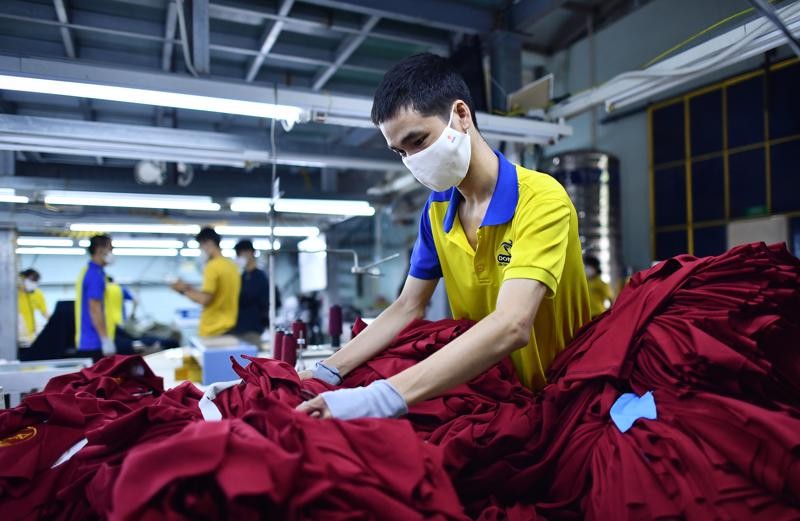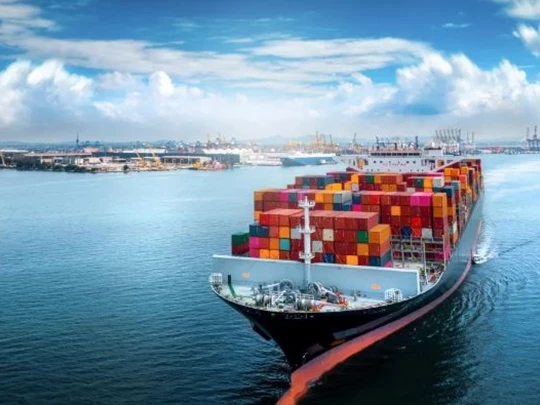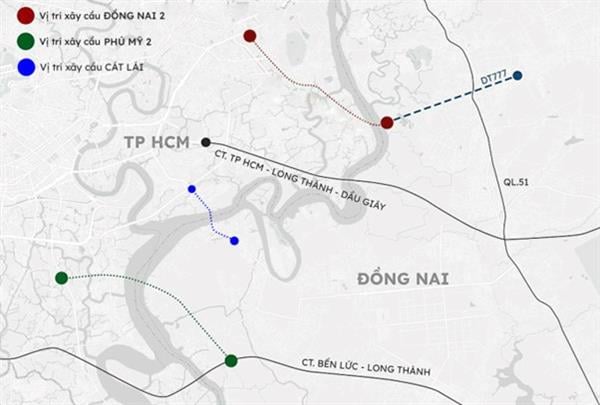| Businesses seek ways to cope with exchange rate fluctuations Coffee prices hit new highs, many export businesses worry about not having goods to sell |
After Iran's retaliatory attack on Israel escalated tensions in the Middle East, Vietnamese export businesses are anxiously monitoring the conflict and its subsequent impacts to find solutions.
Mr. Nguyen Chi Trung - Chairman of the Board of Directors of Gia Dinh Group Joint Stock Company said that the company currently has orders until the end of July, and factories are recruiting more workers. However, in the current context, businesses are also worried because they do not know what the situation will be like in the future.
According to Mr. Trung, the current geopolitical conflict situation is still unpredictable. If the conflict does not stop but continues to spread, export businesses will face more and more difficulties, the biggest of which is the increased transportation costs. "A pair of shoes costs 100 VND, plus 50 VND for transportation, now the transportation cost increases by 60 - 70 VND, businesses will not be able to sell their products," Mr. Nguyen Chi Trung shared.
 |
| Businesses "hold their breath" to monitor the order situation |
Mr. Nguyen Van Khanh - Chairman of the Ho Chi Minh City Leather and Footwear Association admitted that most businesses in the industry are still facing many difficulties in terms of orders. Many factories are still cutting workers due to a sharp decrease in export orders. "According to a recent survey by the association, only about 40% of businesses in the association have orders until May and June. Most of the export orders are to Europe and the US. The rest, from the second quarter to the end of the year, have not had any," said Mr. Khanh.
According to Mr. Khanh, in addition to the difficulties caused by political conflicts, the footwear industry is also facing challenges from the 4.0 revolution, green production, emission reduction, etc.
In addition, the Ministry of Finance’s proposal to impose a 10% tax on exported services will make things even more difficult for businesses because businesses providing exported services will have to pay taxes, which will push up the price of goods. Therefore, manufacturing businesses will have to find new sources of supply from outside. This will cause the supply chain to shift outwards, and bring benefits to other countries.
Also in the vortex of anxiety, Mr. Nguyen Van Thu - Chairman of the Board of Directors of GC Food Joint Stock Company (GC Food), Vice Chairman of the Association for Food Transparency (AFT) - expressed that since the beginning of the year, the company's orders have decreased due to customers' concerns about the unstable situation. "We are currently exporting to the Middle East, although not much, but we still maintain relationships with customers in this market to wait for recovery," said Mr. Thu.
According to Mr. Thu, the conflict in the Middle East has a negative impact on the production and business activities of enterprises, especially export enterprises. The reason is that the prices of input materials for production will increase, transportation costs will also increase and consumers around the world may tighten their spending again due to concerns about instability.
“Even in the best case scenario where all parties exercise restraint and the conflict does not escalate, the world economy will recover slowly and global purchasing power will decrease. It is very likely that in the next few months, prices of many input materials will increase, causing difficulties for businesses,” Mr. Thu worried.
Regarding Dom Garment Company Limited, Mr. Pham Quang Anh - CEO of this company said that in the Middle East market, the company is working with many customers in UAE (United Arab Emirates), Jordan... This market segment currently accounts for about 10% of the company's total export turnover.
 |
| Textile and garment enterprises worried as freight rates increase sharply |
However, the tense regional conflict is causing businesses to worry about the safety of goods during transportation by sea, as well as the rising freight rates.
According to Mr. Quang Anh, if in November 2023 the freight rate for a container (40 feet) to the Jordan market was only 1,450 USD, now the freight rate has increased to 6,000 USD. Along with that, the shipping time is also longer. Normally, customers will place overlapping orders (ie receive an old order and then place a new order), so when the shipping time increases, the business's orders will also decrease by 50% compared to before.
“Most recently, orders shipped to this market took 2.5 months for customers to receive instead of 1 month like before,” Mr. Quang Anh shared.
According to Mr. Quang Anh, when this region becomes tense, businesses must choose shipping lines that are "friendly" to Middle Eastern countries so that goods can be transported more smoothly and easily.
“Goods exported to these countries are already very competitive in price, now that freight rates have increased, businesses have to continue to reduce prices to share with customers. This makes many orders unprofitable,” Mr. Quang Anh informed, adding that if shipping rates continue to increase again, businesses will be forced to bear the cost, find ways to lower product prices or continue to shift to other safer markets.
Source


![[Photo] General Secretary To Lam receives French Ambassador to Vietnam Olivier Brochet](https://vstatic.vietnam.vn/vietnam/resource/IMAGE/2025/4/17/49224f0f12e84b66a73b17eb251f7278)

![[Photo] National Assembly Chairman Tran Thanh Man meets with outstanding workers in the oil and gas industry](https://vstatic.vietnam.vn/vietnam/resource/IMAGE/2025/4/17/1d0de4026b75434ab34279624db7ee4a)
![[Photo] Nhan Dan Newspaper announces the project "Love Vietnam so much"](https://vstatic.vietnam.vn/vietnam/resource/IMAGE/2025/4/17/362f882012d3432783fc92fab1b3e980)
![[Photo] Closing of the 4th Summit of the Partnership for Green Growth and the Global Goals](https://vstatic.vietnam.vn/vietnam/resource/IMAGE/2025/4/17/c0a0df9852c84e58be0a8b939189c85a)
![[Photo] Promoting friendship, solidarity and cooperation between the armies and people of the two countries](https://vstatic.vietnam.vn/vietnam/resource/IMAGE/2025/4/17/0c4d087864f14092aed77252590b6bae)


























![[Photo] Welcoming ceremony for Chinese Defense Minister and delegation for friendship exchange](https://vstatic.vietnam.vn/vietnam/resource/IMAGE/2025/4/17/fadd533046594e5cacbb28de4c4d5655)


























![[Video] Viettel officially puts into operation the largest submarine optical cable line in Vietnam](https://vstatic.vietnam.vn/vietnam/resource/IMAGE/2025/4/17/f19008c6010c4a538cc422cb791ca0a1)








































Comment (0)